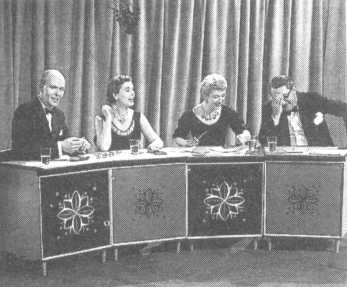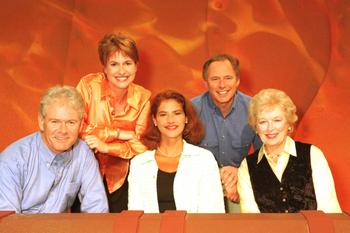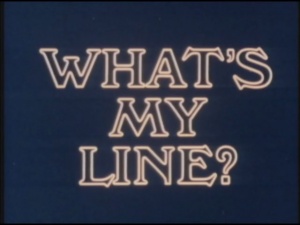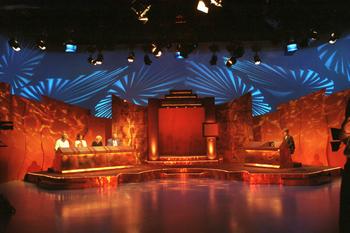What's My Line?
(→Broadcast) |
(→Host) |
||
| Line 7: | Line 7: | ||
[[Eamonn Andrews]] (1951-63, 84-7) | [[Eamonn Andrews]] (1951-63, 84-7) | ||
| - | ( | + | [[Gilbert Harding]] (one episode in 1951, plus at least 17 as stand-in host in 1954 and 1956) |
| + | |||
| + | [[Jerry Desmonde]] (stand-in) | ||
| + | |||
| + | Elizabeth Allen (stand-in) | ||
| + | |||
| + | Ron Randall (stand-in) | ||
[[David Jacobs]] (1973-4) | [[David Jacobs]] (1973-4) | ||
Revision as of 08:18, 6 October 2021
Contents |
Host
Eamonn Andrews (1951-63, 84-7)
Gilbert Harding (one episode in 1951, plus at least 17 as stand-in host in 1954 and 1956)
Jerry Desmonde (stand-in)
Elizabeth Allen (stand-in)
Ron Randall (stand-in)
David Jacobs (1973-4)
Penelope Keith (1988)
Angela Rippon (1988-90)
Emma Forbes (1994-6)
Hugh Dennis (2005 special)
Stephen K. Amos (2011 special)
Co-hosts
Regular panellists: David Nixon, Lady Isobel Barnett, Barbara Kelly, Gilbert Harding, Ted Moult, Katie Boyle, Elizabeth Allan, Marghanita Laski, Jerry Desmonde, Bob Monkhouse, Dawn Addams, Cyril Fletcher, Alan Melville, Kenneth Williams, William Franklyn, Jilly Cooper, George Gale, Ernie Wise, Roy Hudd, June Whitfield, Kate Robbins, Peter Smith, Patrick Mower, Jeffrey Archer.
Voiceover: John Benson (1984-7)
Broadcast
BBC Television Service, 16 July 1951 to 13 May 1963 (413 episodes in 12 series)
BBC2, 23 August 1973 to 25 May 1974 (22 episodes in 2 series + 1 special)
Thames in association with Mark Goodson Productions and Talbot Television for ITV, 26 March 1984 to 31 August 1990 (158 episodes in 7 series + 2 specials)
Fremantle (UK) Productions (formerly Talbot Television) for HTV West and Meridian (regional), 19 September 1994 to 17 December 1996 (42 episodes in 3 series)
BBC Four, 4 October 2005
bbc.co.uk webcast, 5 to 6 March 2011 (24 Hour Panel People)
Synopsis
Classic panel game. Contestants with unusual occupations sign in, perform a mime of the job that they do, then field yes-or-no questions from four celebrities aiming to work out the contestant's job.
Questions answered with a "no" cause the next celeb to pick up the inquisition; ten such "no" answers meant the panel lost and the contestant won - a certificate, in fact. There was very little skill involved on the contestant's part apart from recognising when they had an unusual enough job to stand a good chance at stumping the four wise men (and women).
Three-quarters of the way through the show, a celebrity guest would appear with the trade of being, er, a celebrity guest; the panel would be wearing blindfolds and have to identify the celebrity by name from the Yes/No answers alone - often they would put on a funny accent to disguise their voice.
Originally, Eamonn Andrews and Gilbert Harding were to host the show in rotation, but after a mix-up on Harding's first show (see Trivia below), Andrews took over as full-time host. However, Harding soon returned to the show as a regular panellist and stayed with the programme until his death in November 1960.
 A typical panel - David Nixon, Lady Isobel Barnett, actress luvvie Barbara Kelly, and grump-in-chief Gilbert Harding.
A typical panel - David Nixon, Lady Isobel Barnett, actress luvvie Barbara Kelly, and grump-in-chief Gilbert Harding.The programme had various incarnations on ITV whenever the daytime commissioner had run out of ideas. However, when the show was relaunched in 1984 - this being its longest revival run - it was initially shown in a peak time slot: Eamonn Andrews and Barbara Kelly were the only survivors from the original run. After Andrews' death in 1987, the show moved to a daytime slot, yet it still continued to run until 1990, hosted first by Penelope Keith and then by Angela Rippon.
The programme was brought back for a one-off by BBC Four in 2005 as part of a season on British culture of the 1940s/50s. Hugh "The Grin" Dennis hosted, with a faux posh panel of Brian "Yeeees...." Sewell, Amanda "Think of the children" Platell, Amy "Cake" Lamé and Dave "Dave" Gorman.
Key moments
Inadvertent innuendo aplenty: "Does your job involve animals?" to someone who runs a dating agency, that sort of thing.
They once held a one-off version of this on Children In Need with one guest celebrity, a Margaret Thatcher PM (as she then was). No reason why this happened apart from "just because they could".
On the original series, a 'frogman' who appeared on the show was recognised to be a fraudster. The manager of the bank had seen the programme, called the police and the contestant was sentenced to 15 months in prison.
Lady Isobel Barnett had a "lucky streak" at getting many of the answers right. When Bob Monkhouse sat in her chair one week, he realised that he could see a reflection of the answer (shown on a card for the audience) in the window.
Catchphrases
"And will our next guest sign in please..."
"That's one gone!"
Inventor
Bob Bach, Mark Goodson and Bill Todman. WML? was the first US import of a Goodson and Todman show, and was Britain's first successful game show (as opposed to quiz show). Further Goodson/Todman imports included The Price is Right and Blockbusters.
Theme music
1960s theme by Woolf Phillips.
Trivia
Penelope Keith took over as host after the death of Eamonn Andrews. She lasted one series before being replaced by Angela Rippon.
On one edition, they played a trick on the panel by making Eamonn the mystery guest. This was a fallback plan that had been devised for the original US show in case a guest had to drop out at short notice, and had to be used on 7 December 1952, when the celebrity pulled out due to the Great Smog which engulfed London that week. The studio audience was also much smaller than usual and Gilbert Harding, having been made very ill by the smog himself, but persuaded to appear because no replacement was available in the circumstances, nearly collapsed under the heat of the studio lights.
Unusual occupations which defeated the panel included Jelly Baby Varnisher, Hog Slapper, Catherine Wheel Winder, Pepperpot Perforator and Gibbon Nanny (the last-named featured on the Emma Forbes series). But the weirdest occupation on the programme is widely believed to be a "saggar maker's bottom knocker", the job of a Mr Adams from Stoke-on-Trent. Saggars are used to hold and protect pottery during kiln-firing, and by placing various substances in a saggar it is possible to produce dramatic visual effects on the finished pottery. Don't go away, this is highly educational and nearly interesting. Producing saggars to the precise specifications required is a skilled job and needs a master craftsman - the saggar maker. However, making the bases of the saggars is a less skilled job which can be left to a lesser craftsman, namely the saggar maker's bottom knocker, who makes the bottom of the saggar by placing clay in a metal hoop and literally knocking it into shape. So now you know. Why not amaze your friends with this fascinating fact?
Interestingly, the show that featured the Saggar Maker's Bottom Knocker was actually hosted by Gilbert Harding. He was originally signed up to host the programme in rotation with Andrews, but on his first show as host, someone behind the scenes sent out the guests in a different order to the cards that Gilbert had on his desk. This led to all sorts of confusion when the challenger, a panel beater (the pun was fully intended), was saying YES to answers that Gilbert - expecting a male nurse - swore the answer was NO. Harding became frustrated at the mixup and afterwards declared that he'd never host the show again. This was the cue for boxing commentator Eamonn Andrews to take up the chairman's role full-time. It seems this had been the original plan in any case, and the (very) short-lived rotation of hosts came about only because Harding expressed an interest in the job not knowing it had already been offered to Andrews.
Jerry Desmonde, Elizabeth Allen and Ron Randall all stood in for Eamonn Andrews when he was otherwise engaged. Apparently, when the Australian Randall did so in 1954, he upset a number of viewers through his amorous behaviour. He kissed a female challenger, blew a kiss to viewers at the end of another show and also promised to kiss Barbara Kelly. Fortunately, Andrews soon returned to the programme before any more feathers were ruffled. Clearly, such amorous behaviour was much-frowned upon in the prim and proper 1950s: it hardly seems shocking now - or actually, maybe it does, given all the sex and 'groping' scandals that have come to light in the 2010s. Either way, the adverse reaction must have come as quite a shock to the unfortunate Randall.
According to the book 'The Gameshow Handbook' by David Mason, there were several amusing occupations during the Angela Rippon era. These included a man who was a 'Surgical Shaver' - someone had to shave hair from patients before they underwent operations. There was also someone who trained boxer dogs to play football using balloons as balls, with a goal being awarded every time a balloon burst. They set up a game with Rippon sitting on the edge of the set, ostensibly to give a commentary on the game, but the dogs decided instead to leap on her and lick her all over - she certainly found out the hard way how heavy boxer dogs were. In addition, a lady apparently went to her audition for the show with a parrot on her shoulder. The researcher was about to call her in for her audition, but, on seeing the bird on the lady's shoulder, burst into fits of laughter and had to close the door behind her to cover it up. The producer demanded to know what was going on, the researcher told him and the producer was soon laughing his head off too. It wasn't until about 10 minutes later that the pair were able to control themselves and call the lady and parrot in for the audition, and the bird proved brilliant, performing on miniature roller skates and playing a toy piano with its beak, so naturally, both bird and handler were instantly booked for the programme. It certainly goes to show that first impressions can be all-important at auditions, given that having the parrot on her shoulder gave the lady far more impact than if she'd brought it in a cage.
An enjoyable children's quiz, Secret's Out, was shown on the BBC around the mid-1980's. It was clearly a take on What's My Line, even giving certificates to successful contestants, although it focussed on the unusual hobbies, rather than jobs, of kids and celebrities alike.
Web links
BBC programme page, which includes a 1974 episode as part of a game show collection.
Pictures
 One of the show's more recent hosts, Emma Forbes with a bunch of celebrity panellists.
One of the show's more recent hosts, Emma Forbes with a bunch of celebrity panellists.


